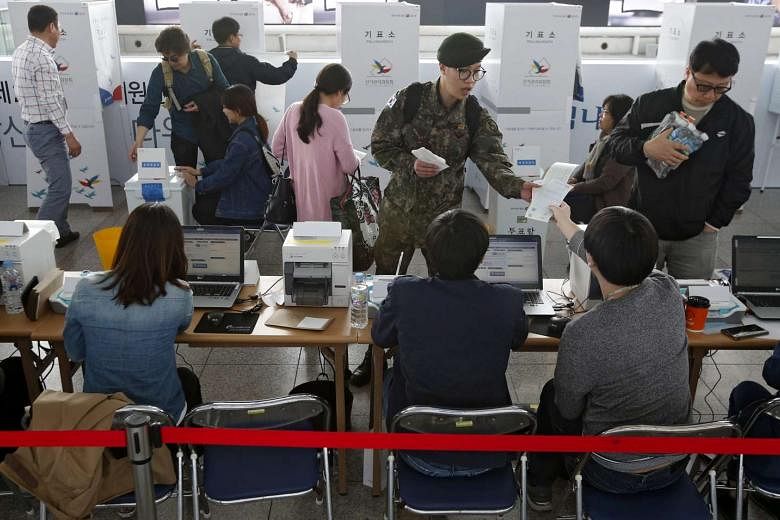SEOUL • Housewife Chung Eun Kyung, 41, voted for South Korea's main opposition party Minjoo as she thought it was time for change.
The ruling Saenuri Party, she felt, did not care enough for the welfare of the people, be it in its failure to address their myriad economic problems or in what she saw as its callous handling of the 2014 Sewol ferry tragedy, in which 250 high school students were among the 304 who died.
"I checked Minjoo's election pledge and it is more caring towards the people," she said, adding that she had hoped when she cast her ballot that it would make a difference.
And a difference it did make.
Ms Chung was among many voters who helped upset the apple cart for Saenuri, which had expected to win a simple majority in Wednesday's general election, by giving Minjoo 123 seats in the 300-seat National Assembly. Saenuri could muster only 122 seats, a seat fewer than Minjoo. A new party, the People's Party that is a splinter of Minjoo, did well to win 38 seats.
This marks the first time in 16 years that a ruling party does not have a majority in Parliament.
Voters, however, are hardly surprised. They have voted with their pocket books, displeased with the Saenuri government's failure to boost the faltering economy or address problems of the people, from high youth unemployment - 12.5 per cent - to income equality and spiralling household debt.
Many voters were also disappointed with the constant fighting within the ruling party between a faction supporting President Park Geun Hye and one against her, and a nomination process deemed as unfair.
"The overwhelming sentiment is people feel the ruling party should be penalised in one way or another for the nomination fiasco," said international relations professor Kim Jae Chun from Sogang University's Graduate School of International Studies. "Even a person like me, who supports the conservatives, went to the ballot box and didn't vote for the ruling party."
Office manager Lee Hun, 45, said he was happy with the strong opposition showing. "The Saenuri Party's direction is not right. It pushed the Parliament to pass economic reforms but I'm not sure if those Bills are related to economic reforms or to support the rich and chaebols," he said, referring to conglomerates.
"Proposed labour reforms are problematic too. People don't believe that companies will use savings from cutting salaries of older workers to hire young workers."
While voter turnout at 58 per cent was higher than the previous two elections, some Saenuri supporters chose to stay away from the ballot box, helping to deal their party a body blow.
One of them was Mr Lee's father, a retired civil servant in his 70s who had supported the Saenuri Party for over 30 years. Mr Lee said the older man flew to Cambodia for a holiday on Polling Day.
"I asked if he voted, he said he doesn't want to vote for any party this time. He's upset with the ruling party but can't bring himself to vote for the opposition, so in the end he just didn't vote."
Chang May Choon

